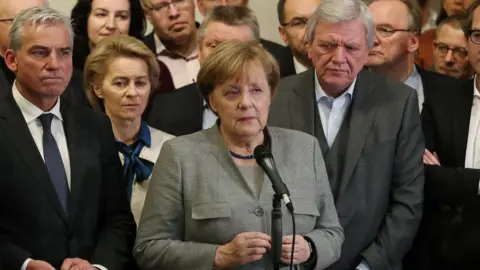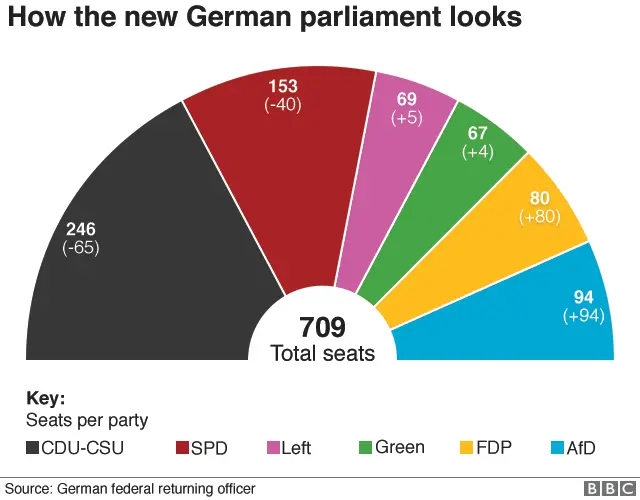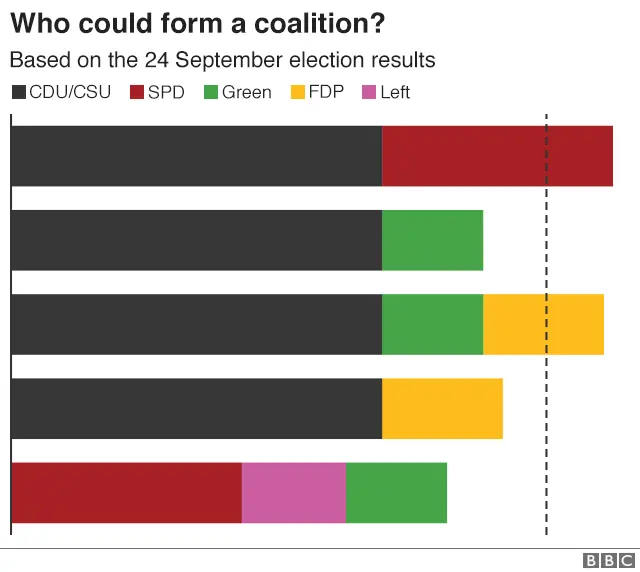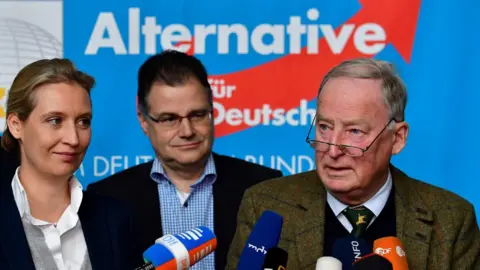Germany political crisis: What are the options?
 Getty Images
Getty ImagesGerman Chancellor Angela Merkel has failed to set up an unprecedented coalition between her conservatives, the Greens and liberal Free Democrats (FDP).
The idea was nicknamed "Jamaica" because of the parties' colours - black, green and yellow, like the Jamaican flag.
So what are the options for Germany now?

Minority government
Mrs Merkel's Christian Democrats (CDU), with their Bavarian sister party the CSU, could form a minority government with either the Greens or the FDP.
But that option is considered unlikely, because it has not been tested at federal level in Germany before.
If the CDU/CSU joined with the FDP, the administration would be 29 seats short of a majority in the Bundestag (lower house).
If the CDU/CSU joined with the Greens, this would be 42 seats short.
 EPA
EPAMs Merkel, a veteran coalition-builder with three terms as chancellor already behind her, sees herself as a symbol of strong and stable government.
The minority option would be very risky for her, especially as Germany faces serious challenges with deep-rooted eurozone tensions, immigration pressure and Brexit.



Another 'grand coalition'
Before the September election, Ms Merkel governed in coalition with the centre-left Social Democrats (SPD). But the SPD has ruled out repeating such an alliance.
"The SPD is in any case not the spare wheel for Mrs Merkel's skidding car," said SPD deputy leader Thorsten Schäfer-Gümbel.
There is still some speculation that the SPD might change its mind.
With the SPD, Ms Merkel would have a majority.
Ms Merkel's conservatives slumped to 32.9% in the election, and the SPD also lost seats, ending up with 20.5%.
Many are now asking whether Ms Merkel would have to resign, to enable the CDU/CSU to govern with any of the other parties.
But it is far from clear who might succeed Ms Merkel as head of the CDU/CSU.

 AFP
AFPFresh election
This option is the most likely if the German president's choice for chancellor fails to get majority support in the Bundestag.
A chancellor candidate who fails to get an absolute majority when the Bundestag votes, and who struggles to form a governing coalition, could dissolve parliament and call a new election.
The fear among Germany's mainstream liberal democratic parties is that the far-right Alternative for Germany (AfD) could do even better next time.
The AfD won 94 seats in the Bundestag, giving it real clout at federal level for the first time.
It won over many voters unhappy about Ms Merkel's liberal immigration policy, after Germany took in more than a million refugees in 2014-2015.
For decades Germany has enjoyed a reputation for solid, centrist coalition government. That has helped European stability in troubled times. So a fresh election would make many fellow Europeans nervous.
